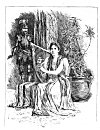 Click to enlarge The fair Pœana playing on a rote.'' |
Of all human affection the love of one friend for another is surely the noblest and most unselfish; and this true friendship Amyas, and Placidas had for each other--not even their affection for kindred or fairest lady could shake their loyalty. For though Pœana were as beautiful as the morning, yet Placidas, for his friend's sake, scorned her offered favours. His only thought was what he could do to set Amyas free.
Now after Prince Arthur had promised to succour the Squire who had lain so long in prison, he next began to consider how best he could effect his purpose. Taking up the dead body of the Giant, he firmly bound
 Click to enlarge The fair Pœana playing on a rote.'' |
it on the dromedary, and made it so to ride as if it were alive. Then he took Placidas and placed him in front of Corflambo, as if he were a captive; and he made the dwarf (though very unwillingly) guide the beast till they drew near the castle. When the watchman who kept continual guard saw them thus coming home, he ran down, without doubt or fear, and unbarred the gate, and the Prince following passed in with the others.
There in her delicious bower he found the fair Pœana playing on a rote, complaining of her cruel lover, and singing all her sorrow in music. So sweet and lovely she seemed that the Prince was half-entranced, but wisely bethinking himself of what was right, he caught her unawares and held her captive.
Then he took the dwarf and compelled him to open the prison door, and to bring forth the thralls which he kept there. Over a score of unknown knights and squires were brought to him, all of whom he freed from their bitter bondage, and restored to their former liberty. Among the rest came the Squire of low degree, all weak and wan. As soon as Emilia and Placidas beheld him they both ran and embraced him, holding him fast between them, and striving all they could to comfort him.
The Giant's daughter, seeing this, envied them both, and bitterly railed at them, weeping with rage and jealousy. But when they had been for some time together, talking over their adventures, although Pœana had often seen Amyas and Placidas separately, she began to doubt which was really the captive Squire
whom she had loved so dearly; for they appeared so alike in face and person that it was difficult to discover which was which. So also Prince Arthur was amazed at their resemblance, and gazed long in wonder, as did the other knights and squires who saw them.
Then they began to ransack the Giant's castle, in which they found great store of hoarded treasure, which the tyrant had gathered by wicked means. Prince Arthur took possession of this, and afterwards remained a little while at the castle to rest himself, and refresh the ladies Amoret and Emilia, after their weary toll. To these also he gave part of the treasure.
To add to the rejoicing, he set free the captive lady, the fair Pœana, and placed her in a chair of state with the rest, to feast and frolic. But she would show no gladness nor pleasant glee, for she was grieved for the loss both of her father and of her lands and money. But most of all she deeply grieved for the loss of the gentle Squire Placidas, whom she now really loved.
But Prince Arthur, with his accustomed grace, charmed her to mild behaviour from the sullen rudeness which spoilt her. With gentle words and manner he calmed her raging temper, and softened the bitterness that gnawed at her heart and kept her from the feast; for although she was most fair to see, she spoilt all her beauty by cruelty and pride. And in order to end everything with friendly love--since love was the cause of her grief--Prince Arthur wisely urged the trusty Squire Placidas not to despise without better trial the lady who loved him so dearly, but to accept
her to he his wedded wife. Placidas was quite willing to marry Pœana; so all their strife came to an end.
From that day forth they lived long together in peace and happiness. no private quarrel nor spite of enemies could shake the calm security of their position. And she whom Nature had created so fair that she could match the fairest of them all, and vet who had spoilt it by her own wayward folly, henceforth reformed her ways, so that all men marvelled at the change, and spoke in praise of her.
Thus having settled these friends, Amyas and Placidas, in peace and rest (for Amyas, of course, married his dear Emilia), Prince Arthur again went on his way; and with him went the Lady Amoret, for she had still to find her husband, the good Knight Scudamour.